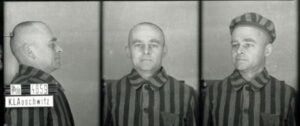Witold Pilecki was a figure that the communists wanted to erase from Polish history. Much was done to make this man completely forgotten. Fortunately for our history, culture, traditions and social consciousness, the Bolsheviks failed to erase the traces of this great Polish hero. After Poland regained its independence in 1989, people began to remember him. A large number of publications of various kinds were written about him. Many cities in Poland decided to honor him, either by erecting a monument to him, or by naming parks, squares, streets, as well as schools, etc., after him.
In Warsaw, a monument to Pilecki was erected on Wojska Polskiego Avenue. It was there, on September 19, 1940, that the officer was detained by the Germans in a huge roundup, and then was taken to a place that has gone down in history as „hell on earth” – Konzentrationslager Auchwitz.
Pilecki was a Polish patriot who fought for the Fatherland already during the Polish-Bolshevik war. And it is worth recalling that he was less than twenty years old at the time. Later he realized himself as a social activist, a landowner who ran an estate, as well as a reserve officer or poet. No wonder, then, that when the Germans and Soviets triggered World War II, invading Poland in September 1939. Pilecki moved to fight. He was a soldier in the 19th and 41st Infantry Divisions.
After the defeat, however, he did not lay down his arms. He left for Warsaw and, together with a group of friends, founded one of the first underground organizations, the Polish Secret Army. Major Jan Wlodarkiewicz became its commander, while the main character of this sketch took the position of chief of staff, assuming the pseudonym „Witold”. It was an organization that consisted mainly of soldiers and civilians who were close to Christian ideas. It is therefore not surprising that TAP activists, or at least its founders, took the oath of office at the hands of the legendary Polish priest Father Jan Zieja.
In mid-1940, several TAP members from the organization’s top leadership were detained by the Germans. After conducting an interview, it turned out that these people had been deported to Auschwitz concentration camp, which was located in the military barracks located in what is now Oswiecim. At the time, no one imagined that the site would become a symbol of German crimes during World War II. Initially, Auschwitz was one of many concentration camps that Nazi Germany had already established since the 1930s.
Auschwitz began operating on June 14, 1940, the day the first detainees arrived from the Tarnów prison. This group included, for example, Tadeusz „Teddy” Pietrzykowski – a pre-war Polish boxer who also had to fight for his life with his fists while in KL Auchwitz.
In August 1940, i.e. at the time of the arrests of several of Pilecki’s comrades, Wlodarkiewicz organized a meeting at which the decision was made that „Witold,” then holding the military rank of second lieutenant, would be sent to Auchwitz.
His most important tasks were to check the possibility of freeing the prisoners held there and to organize an intelligence network. Thus, many historical studies reproduce the erroneous information that the initiator of the above-described operation, i.e. getting to Auschwitz, was Pilecki himself.
The second lieutenant was forced to do so, perhaps by order or perhaps by pressure, by his commander, namely Jan Wlodarkiewicz. The latter was even said to have told Pilecki: „Well, an honor has befallen you, your name I mentioned to „Grot” [Gen. Stefan Rowecki] as the only officer who will do this [perform the task in Auschwitz].” Some researchers, however, believe that „Witold’s” dispatch outside of Warsaw may have been caused by the TAP commandant’s reluctance to discuss the talks Pilecki had undertaken with representatives of Poland’s most important and largest underground organization, the Union for Armed Struggle, which concerned the merger of the two organizations. The incident escalated into a dispute, which Pilecki recalled in his postwar report.
Despite Wlodarkiewicz’s decision, Pilecki was not entirely convinced of the rightness of carrying out the above-described task. For this reason, he avoided the roundup that took place in Warsaw’s Zoliborz district, back in the first half of August 1940. However, he eventually decided to go to Auschwitz. However, he only had to wait for the right opportunity. That opportunity came on the morning of September 19, 1940. On that day, the Germans carried out a huge roundup that included Warsaw neighborhoods such as Grochow and Zoliborz, and even houses on Grojecka Street. At the time, the Germans surrounded residential buildings and then entered individual apartments and led out the men, ranging in age from eighteen to forty-five. At the time, Pilecki was staying with his sister-in-law Eleonora Ostrowska, who lived on Wojska Polskiego Avenue, mentioned at the beginning. Just before the Germans came to this apartment, the door was knocked on by the caretaker – Jan Kiliański (a member of TAP), who passed on information about the round-up and offered „Witold” two possibilities for escape. However, this one, to Ostrowska’s and Kilianski’s surprise, did not decide on such a step, but allowed the Nazis to detain him. He was then deported, like nearly two thousand others, to the barracks on Warsaw’s Szwoleżerów Street, where Jozef Pilsudski’s 1st Light Cavalry Regiment was stationed before the outbreak of war.
A day later, the Germans registered the convicts – Pilecki was then acting under the name of Tomasz Serafiński – and in the following days began deporting them. Some of them were sent to forced labor in East Prussia, others to labor camps in West Germany and still others to Auschwitz. The latter, by the way, were the largest number – more than one thousand one hundred men, among whom was Pilecki.
The transport reached its destination on the night of September 21-22, 1940. For Witold Pilecki, who from that moment was number 4859, a completely new, and what a difficult moment of life began.


